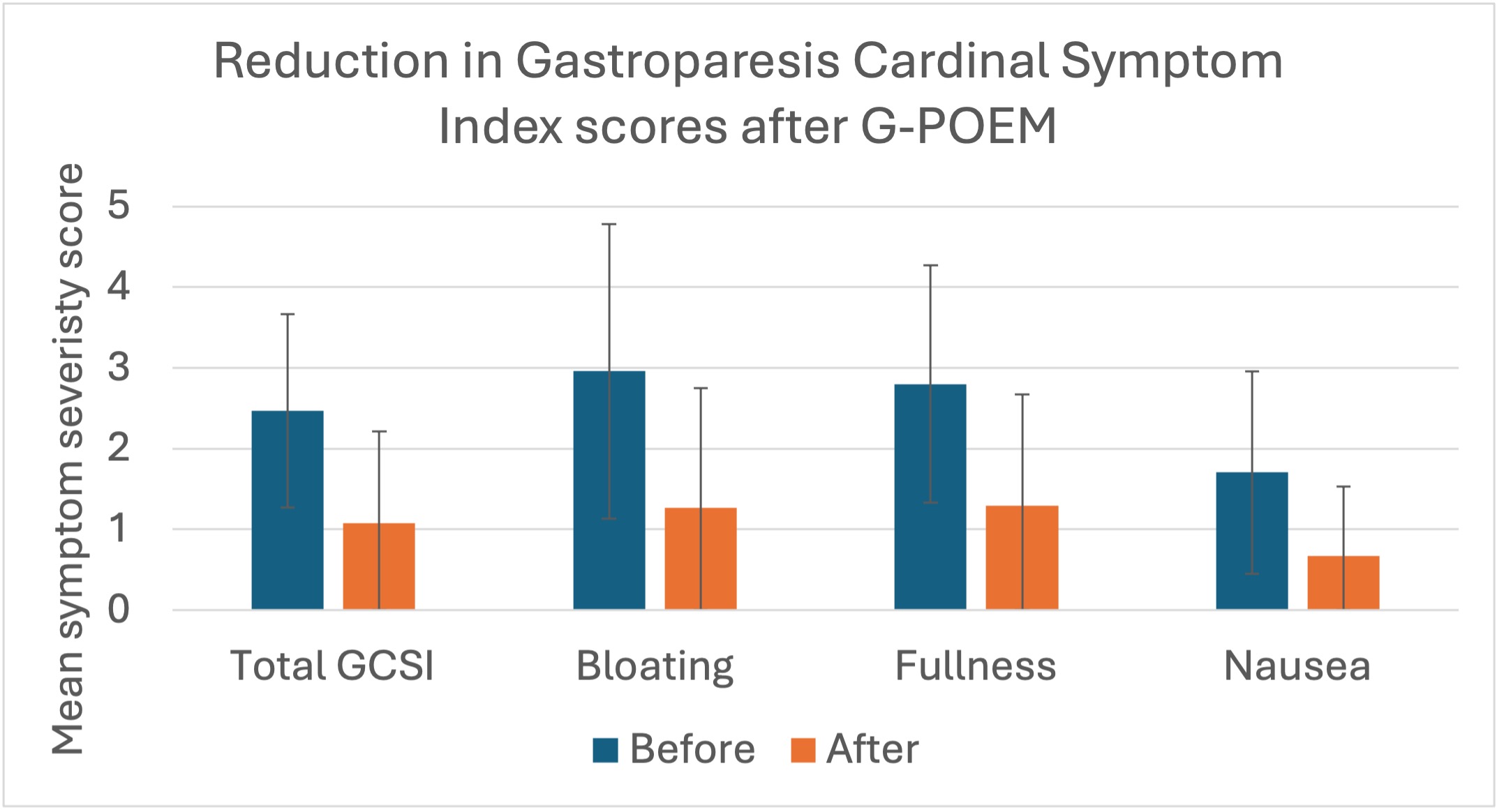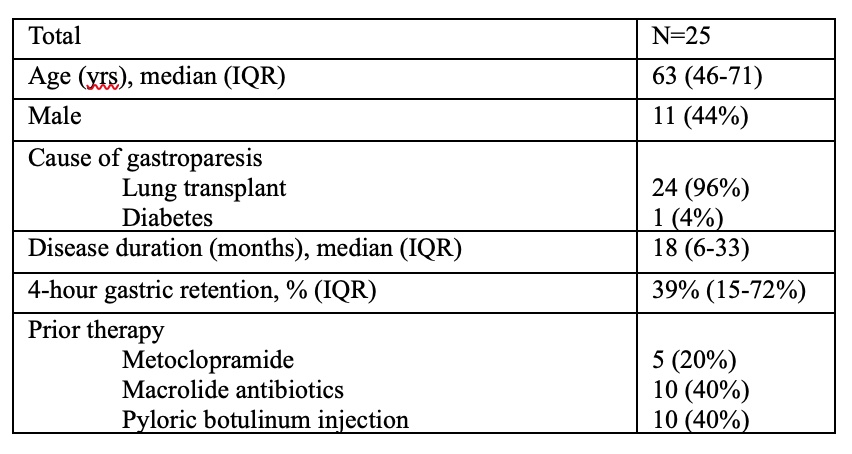Monday Poster Session
Category: Interventional Endoscopy
P3515 - Utility of Gastric Peroral Endoscopic Myotomy (G-POEM) for Gastroparesis After Lung Transplant
Monday, October 27, 2025
10:30 AM - 4:00 PM PDT
Location: Exhibit Hall

William King, MD
University of Florida
Gainesville, FL
Presenting Author(s)
William King, MD1, Dennis Yang, MD2, Hannah Zuercher, MD3, Peter Draganov, MD, FACG1
1University of Florida, Gainesville, FL; 2AdventHealth, Orlando, FL; 3University of Florida Health Shands Hospital, Gainesville, FL
Introduction: Gastroparesis (GP) is common among lung transplant recipients and can worsen GERD, thereby inducing microaspiration and graft failure.
Methods: We conducted a retrospective study at two centers on the safety and efficacy of gastric peroral endoscopic myotomy (G-POEM) among lung transplant recipients. We defined GP as >10% retention at 4 hours. We measured symptoms with the Gastroparesis Cardinal Symptom Index (GCSI), which contains three subscales: bloating, fullness/satiety, and nausea/vomiting. Clinical success was defined as a one point an overall reduction in total GCSI and a 25% reduction in at least one GCSI subscore.
Results: We identified 25 patients, median age 63 years (interquartile range [IQR] 46-71), 44% male (Table). Median duration of gastroparesis was 18 months (IQR 6-33). Median retention at 2 and 4 hours was 82% (IQR 62-86%) and 58% (IQR 38-70%), respectively. 24 (96%) had a new diagnosis of GP following LTx, while one had preexisting GP due to diabetes. Baseline GCSI was 2.3 (IQR: 1.3 to 3.6). Four symptoms median GCSI score was “severe”: early satiety, bloating, and pre and postprandial fullness.
All achieved technical success. None experienced adverse events of ASGE grade III or higher.Error! Bookmark not defined. One had a duodenal mucosal disruption, managed with antibiotics and a nasogastric tube to suction. He did not require repeat intervention and was discharged three days later. There were no other adverse events reported. Ten (40%) were discharged the same day; the longest hospitalization was 3 days.
Median follow up was 4 months (IQR 3 to 8). One was lost to follow up and one died of a pulmonary embolism. Among the 23 remaining, 21 (91%) achieved clinical success (Figure). Median GCSI decreased from 2.3 (IQR 1.3-3.6) to 0.7 (0-1.8), p=0.0002. GCSI subscores improved for bloating (2.5 [IQR: 1.5-5] to 0.8 [IQR 0-2.5], p=0.002), nausea (3.0 [IQR 1.8-4.3] to 1.8 [IQR 0.4-2.6], p=0.0005), and fullness (1.3 [IQR 0.7-2.7] to 1.0 [IQ 0.8-2.0], p=0.004).
3 had a repeat gastric emptying study after G-POEM. Median 4-hour retention improved from 60% (IQR 58-60%) to 16% (IQR 0-28%), p=0.25. After G-POEM, 40% (n=10) were able to discontinue prokinetics; 44% (n=11) continued previous medications, and 16% (n=4) started new prokinetic therapy.
Discussion: G-POEM is feasible and safe in lung transplant recipients and significantly improves symptoms in most patients. As many of these patients have limited options, G-POEM is a viable therapy.

Figure: Table. Baseline patient characteristics

Figure: Figure. Gastroparesis cardinal symptoms index (GCSI) before and after G-POEM among patients with lung transplant
Disclosures:
William King indicated no relevant financial relationships.
Dennis Yang: 3D-Matrix – Consultant. Boston Scientific – Consultant. ERBE – Consultant. Fujifilm – Consultant. Medtronic – Consultant. Microtech – Consultant. Neptune Medical – Consultant. Olympus – Consultant.
Hannah Zuercher indicated no relevant financial relationships.
Peter Draganov: Boston Scientific – Consultant. Cook Medical – Consultant. Fujifilm – Consultant. Medtronic – Consultant. Olympus – Consultant.
William King, MD1, Dennis Yang, MD2, Hannah Zuercher, MD3, Peter Draganov, MD, FACG1. P3515 - Utility of Gastric Peroral Endoscopic Myotomy (G-POEM) for Gastroparesis After Lung Transplant, ACG 2025 Annual Scientific Meeting Abstracts. Phoenix, AZ: American College of Gastroenterology.
1University of Florida, Gainesville, FL; 2AdventHealth, Orlando, FL; 3University of Florida Health Shands Hospital, Gainesville, FL
Introduction: Gastroparesis (GP) is common among lung transplant recipients and can worsen GERD, thereby inducing microaspiration and graft failure.
Methods: We conducted a retrospective study at two centers on the safety and efficacy of gastric peroral endoscopic myotomy (G-POEM) among lung transplant recipients. We defined GP as >10% retention at 4 hours. We measured symptoms with the Gastroparesis Cardinal Symptom Index (GCSI), which contains three subscales: bloating, fullness/satiety, and nausea/vomiting. Clinical success was defined as a one point an overall reduction in total GCSI and a 25% reduction in at least one GCSI subscore.
Results: We identified 25 patients, median age 63 years (interquartile range [IQR] 46-71), 44% male (Table). Median duration of gastroparesis was 18 months (IQR 6-33). Median retention at 2 and 4 hours was 82% (IQR 62-86%) and 58% (IQR 38-70%), respectively. 24 (96%) had a new diagnosis of GP following LTx, while one had preexisting GP due to diabetes. Baseline GCSI was 2.3 (IQR: 1.3 to 3.6). Four symptoms median GCSI score was “severe”: early satiety, bloating, and pre and postprandial fullness.
All achieved technical success. None experienced adverse events of ASGE grade III or higher.Error! Bookmark not defined. One had a duodenal mucosal disruption, managed with antibiotics and a nasogastric tube to suction. He did not require repeat intervention and was discharged three days later. There were no other adverse events reported. Ten (40%) were discharged the same day; the longest hospitalization was 3 days.
Median follow up was 4 months (IQR 3 to 8). One was lost to follow up and one died of a pulmonary embolism. Among the 23 remaining, 21 (91%) achieved clinical success (Figure). Median GCSI decreased from 2.3 (IQR 1.3-3.6) to 0.7 (0-1.8), p=0.0002. GCSI subscores improved for bloating (2.5 [IQR: 1.5-5] to 0.8 [IQR 0-2.5], p=0.002), nausea (3.0 [IQR 1.8-4.3] to 1.8 [IQR 0.4-2.6], p=0.0005), and fullness (1.3 [IQR 0.7-2.7] to 1.0 [IQ 0.8-2.0], p=0.004).
3 had a repeat gastric emptying study after G-POEM. Median 4-hour retention improved from 60% (IQR 58-60%) to 16% (IQR 0-28%), p=0.25. After G-POEM, 40% (n=10) were able to discontinue prokinetics; 44% (n=11) continued previous medications, and 16% (n=4) started new prokinetic therapy.
Discussion: G-POEM is feasible and safe in lung transplant recipients and significantly improves symptoms in most patients. As many of these patients have limited options, G-POEM is a viable therapy.

Figure: Table. Baseline patient characteristics

Figure: Figure. Gastroparesis cardinal symptoms index (GCSI) before and after G-POEM among patients with lung transplant
Disclosures:
William King indicated no relevant financial relationships.
Dennis Yang: 3D-Matrix – Consultant. Boston Scientific – Consultant. ERBE – Consultant. Fujifilm – Consultant. Medtronic – Consultant. Microtech – Consultant. Neptune Medical – Consultant. Olympus – Consultant.
Hannah Zuercher indicated no relevant financial relationships.
Peter Draganov: Boston Scientific – Consultant. Cook Medical – Consultant. Fujifilm – Consultant. Medtronic – Consultant. Olympus – Consultant.
William King, MD1, Dennis Yang, MD2, Hannah Zuercher, MD3, Peter Draganov, MD, FACG1. P3515 - Utility of Gastric Peroral Endoscopic Myotomy (G-POEM) for Gastroparesis After Lung Transplant, ACG 2025 Annual Scientific Meeting Abstracts. Phoenix, AZ: American College of Gastroenterology.

